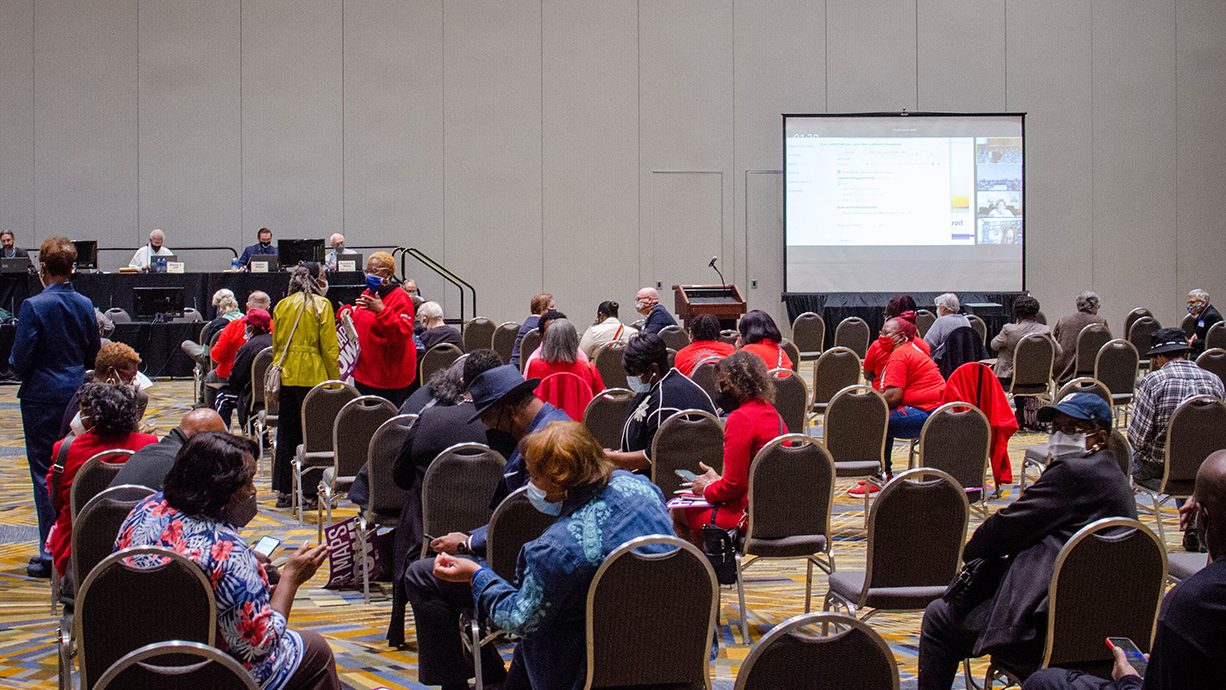Michigan Supreme Court Rules Against Redistricting Commission in First Major Lawsuit
Monday’s 4-to-3 ruling means the private memos — along with a recording of the closed-door session — will become public.

Members of the public voice concerns during a Michigan Independent Citizens Redistricting Commission's public hearing at TCF Center in Detroit, Oct. 20, 2021.
The state Supreme Court is siding against the Michigan Independent Citizens Redistricting Commission.
A group of news outlets sued the commission after it discussed memos in secret during an October meeting. The memos covered legal opinions on the Voting Rights Act and historic discrimination.
Lawyers for the commission argued that releasing the memos would violate attorney-client privilege.
Monday’s 4-to-3 ruling means the private memos — along with a recording of the closed-door session — will become public.
MichMash hosts Jake Neher and Cheyna Roth talk with MLive reporter Lauren Gibbons about why several news organizations are suing the commission.
Subscribe to MichMash on iTunes, Spotify, Google Podcasts, NPR One or wherever you get your podcasts.
The Michigan Supreme Court heard oral arguments last week about whether the commission has to release the memos and documents on how it it’s been coming up with these district lines that it’s considering adopting for the state. Several news outlets — the Detroit Free Press, The Detroit News, Bridge and the Michigan Press Association — filed the lawsuit when the commission refused to give them up earlier this year.
“The lawsuit that’s going on actually has nothing to do with those maps at all,” Gibbons told Neher and Roth before the Supreme Court’s decision came down.
“This is about whether the legal memos that were discussed during a closed session last October should be released to the public. The argument that the media organizations involved is making is that these legal memos, which regarded the Voting Rights Act and voting related discrimination in Michigan, that those should be a matter of public record. The commission is arguing that it’s protected under attorney client privilege.”
“This particular redistricting process, everything about it is precedent setting, right? Because this is the first time Michigan has had a citizens independent panel are drawing the maps and previously it was the legislature.” –Lauren Gibbons, MLive
While the lawsuit itself doesn’t directly impact the map making process, the deadline for voting on the map drafts is coming up. The commission has a vote planned for Dec. 28.
“That said, the schedule could remain in flux,” Gibbons said. “The commission met to consider some more business items. It’s the last scheduled day of the agenda, but there’s still a lot of people who want to make public comments. And so, it’s possible the commission could add a few more meeting dates. They technically still could change the schedule quite a bit, and not stay true to that December 28 date that they were hoping to start getting voted on.”
While the lawsuit won’t have a direct impact on the making of these maps, Gibbons said it could have an impact on setting a precedent in the redistricting process and what is protected under the Open Meetings Act.
“This particular redistricting process, everything about it is precedent setting, right? Because this is the first time Michigan has had a citizens independent panel are drawing the maps and previously it was the legislature,” Gibbons said. “And what ultimately ends up happening will chart the course for future redistricting processes.”
More from MichMash:
Bills to Address Gun Violence Languish in Legislature Amid Calls for Action
Michigan Would Revert to Restrictive Abortion Ban If Roe v. Wade Is Overturned
What We’re Learning As Michigan Redistricting Commission’s First Political Maps Take Shape
Infrastructure Package Could Be Big Boost for Michigan, But Major Challenges Remain
Trusted, accurate, up-to-date.
WDET strives to make our journalism accessible to everyone. As a public media institution, we maintain our journalistic integrity through independent support from readers like you. If you value WDET as your source of news, music and conversation, please make a gift today.
